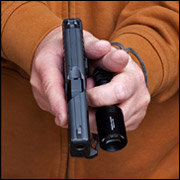Very much appreciate this balanced statement. Thank you, Darryl.
GJM beat me to it.
John, your paragraph is essentially right and could also have just a few words changed to apply to proper match speed. I wouldn’t at all dispute that the dynamics involved in the real world may end up being different from the dynamics represented in a match (either more complex and difficult or much simpler and easier – a point tangentially raised by your last paragraph regarding the typical character of .mil vs. LE vs. private citizen shootings.) But, the overarching manner of successful competitive shooting is not different than what you are describing.
And I would add that one of the most essential mental/mechanical tasks in competitive shooting is to address a variety of difficulties of shooting problem in rapid succession, with correctness (accuracy) and efficiency (speed) appropriate to the problem being dealt with right now, as well as all the on-the-fly adjustment and correction that emerges even in something that may be complicated but static like an action pistol stage. It isn’t about the calibration of one correct speed or accuracy level to shoot at. It is calibration of shooting a correct way – do what’s needed to hit the target – that correct way varying according to the exact problem at hand.
It took me not winning a gun at I think two GSSF matches a few years ago to ‘get it.’ It was a real moment of epiphany in practicing for GSSF after those two matches, when I realized that the only profitable thing to do is shoot the center of every target with every shot. Nothing else is worthwhile. There’s a lot more noise involved in USPSA, but I still think that relationship mostly holds true there as well.
Here are some quotes from Brian Enos that I saved a couple of years ago. I found them very profound at the time, and I think they illustrate how little difference there is between shooting done correctly in one context vs. another:





 Reply With Quote
Reply With Quote
 . Snarky and easily butt hurt. Favorite animal is the Cape Buffalo....likely indicative of a personality disorder.
. Snarky and easily butt hurt. Favorite animal is the Cape Buffalo....likely indicative of a personality disorder.




